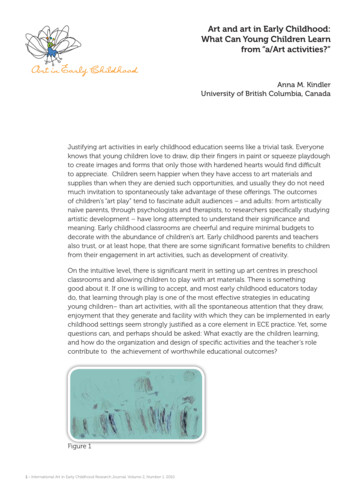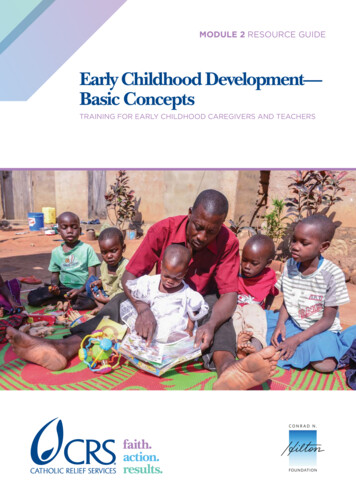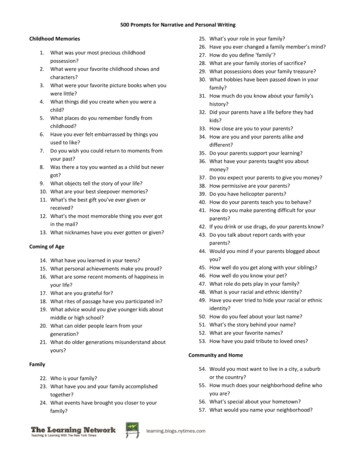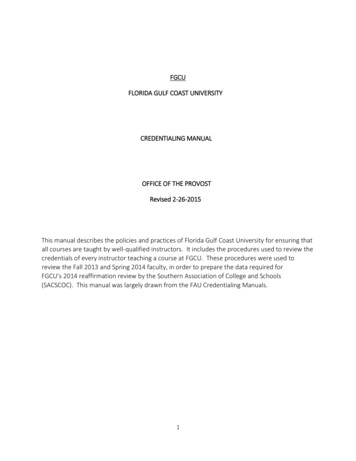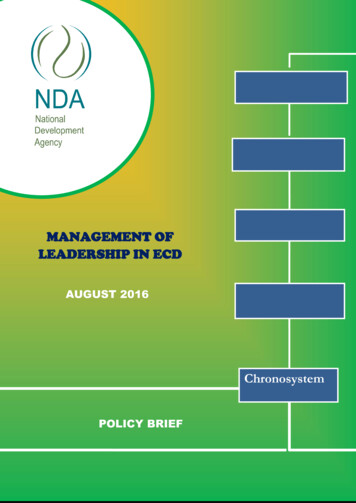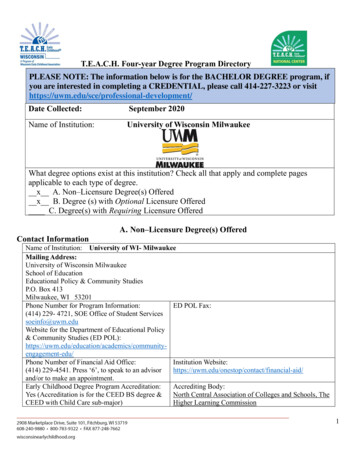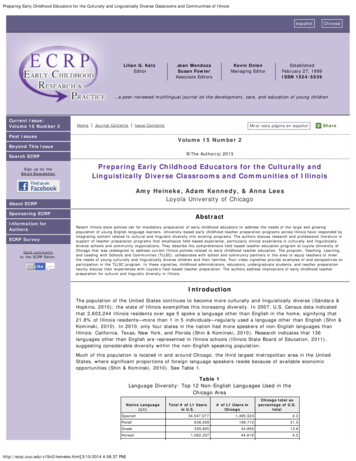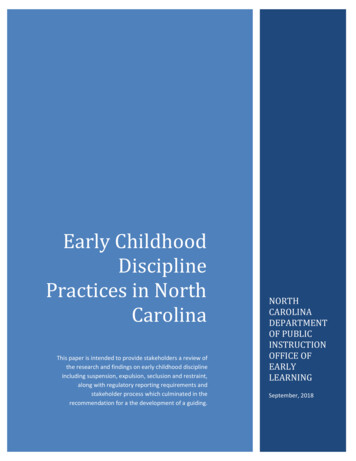
Transcription
Early ChildhoodDisciplinePractices in NorthCarolinaThis paper is intended to provide stakeholders a review ofthe research and findings on early childhood disciplineincluding suspension, expulsion, seclusion and restraint,along with regulatory reporting requirements andstakeholder process which culminated in therecommendation for a the development of a guiding.NORTHCAROLINADEPARTMENTOF PUBLICINSTRUCTIONOFFICE OFEARLYLEARNINGSeptember, 2018
The following people are acknowledged for their work in the development and review of this documentVivian JamesPh.D., Preschool Exceptional Children 619 CoordinatorOffice of Early Learning, NC Department of Public Instruction, lead writerReviewers:Julie AulM.A., Executive Director Exceptional ChildrenCumberland County Schools, reviewerDenise BrewerPh.D., Interim Chair, Family & Child StudiesAppalachian State University, reviewerDebbie CateM.A., Technical Assistance SpecialistEarly Childhood Technical Assistance Center, reviewerSuzanne CottermanM.A., Director, Office of Early EducationDurham Public Schools, reviewerJamie GuzmanHead Start AdministratorEast Coast Migrant Head StartAdam HollandPh.D., ConsultantFrank Porter Graham Child Development Institute, NC Early Learning Network,reviewerLynn MakorM.A., CAGS, Consultant for School PsychologyExceptional Children Division/ Carolina Institute for Developmental Disabilities,reviewerRobin RooneyPh.D., Director (retired)NC Early Learning Network, reviewerVicky SproulM.S. Early Literacy DirectorCaldwell County Schools, reviewerSherri WilliamsMPH, DirectorFrank Porter Graham Child Development Institute, NC Early Learning Network,reviewerHelena VanhornM.A, Preschool Program CoordinatorCaldwell County Schools, reviewer2Early Childhood Discipline Practices in North Carolina
Introduction – NC Public Schools Preschool ProfileAccording to data from the Preschool Handicapped Grant (May 2017) collected from all 115 traditional LocalEducation Agencies (LEA) in NC, there are over 2,000 preschool classrooms operated by North Carolina’spublic schools (See, Figure 1). Funding for preschool programs in the public schools comes from Title 1, NCPre-K, Exceptional Children, Developmental Day, Head Start administered in the public schools, fee for serviceand local funds. The age of eligibility begins at age 3 for the Exceptional Children, Developmental Day andsome Head Start programs. NC Pre-K and Title I Preschool require children to be 4 by the start of school. TheExceptional Children program must provide a Free and Appropriate Public Education to all children identifiedas having a disability and must serve eligible children as they become eligible throughout the year, starting atage 3, and are not automatically eligible for funding from NC Pre-K, Title I nor Head Start. NC Pre-K, Title I andHead Start are targeted for “at-risk” populations based on need and is based on availability of funds.According to the December 2017 NC Pre-K Program data report, over 1,100 NC Pre-K classes are operated bythe public schools (including Head Start programs administered by the public schools that also receive NC PreK funds). Therefore, about 54% of public school preschool classrooms operate under NC Pre-K requirementsas administered by the Division of Child Development and Early Education (DCDEE) in the Department andHealth and Human Services. In addition, there are 15 school systems that are the grantees for local HeadStart programs; and, more school systems house Head Start classes that have outside agencies (i.e.,community action agencies) as their grantees.Licensure StatusInclusive ClassesSeparate ClassesTotalLicensed1,230 (81%)181 (35%)1,411 (69%)Not Licensed295 (19%)336 (65%)631 (31%)Total1,5255172,042Figure 1. Status of Public School Operated Preschool Classes Data Source-619 Preschool Grant, 2017Inclusive classrooms are those that contain typically developing children and children with disabilities.Federal requirements mandate that at least 50% of the children in inclusive classroom must not have anIndividualized Education Plan (IEP). Separate classes are those that have more than 50% of enrolled childrenwho have a disability. Childcare licensure is a program requirement in NC Pre-K and the Developmental Dayprograms and is regulated by the DCDEE; however, it is not a requirement for all programs administered bythe public schools. To better understand the relationship between the various preschool programs and theirchild care licensure requirements, please see Apendix A. NC’s childcare licensure process binds the QualityRating Improvement System (QRIS) with childcare facility, safety and sanitation requirements. The NC QRIS ison a 5-point scale with a 1-star rating identifying those meeting minimal requirements a 5- star, the highest.Over 81% of inclusive classrooms have achieved a 4- or 5-star rating, with 35% of separate self-containedclassrooms achieving the same licensure rating. While participating in the QRIS system is a nationallyrecognized measure of classroom quality, the primary focus is on health, sanitation, and safety with asecondary emphasis on teacher-child interaction. The QRIS system does not measure the implementation ofevidenced-based instructional practices which is a goal of public school preschool programs as part of theMulti-Tiered System of Support.The current profile of preschool programs operated by NC’s public schools depicts the blending of differentprograms for serving as many at-risk and disabled preschoolers as possible to ensure Kindergarten readinessand promote later school success.Early Childhood Discipline Practices in North Carolina3
PurposeThe North Carolina Department of Public Instruction (NCDPI) is charged with implementing the state’s publicschool laws for pre-kindergarten through 12th grade at the direction of the State Board of Education and theSuperintendent of Public Instruction. The task of early childhood program administrators and/or principals inpublic schools is to be cognizant of the varying program policies, requirements, and rules set forth for childcare licensure since DCDEE performs regulatory authority over classrooms voluntarily licensed in publicsettings. This encompasses over 69% of all public school preschool classes. The dilemma is that existingdiscipline policies noted in public school law (Article 27) are not always appropriate for children ages 3, 4, and 5years of age, and do not align with Head Start federal policies nor DCDEE licensing rules (Chapter 9 Child CareRules, Section. 1800-Discipline) which are based on N.C. General Statutes for Child Care. Clarity is neededthrough the issuance of an early childhood guiding practices on discipline for public school preschool programswith an additional emphasis on the implementation of evidence-based teaching practices to preventchallenging behaviors and facilitate positive child outcomes in social-emotional development, in addition toensuring accountability for disciplinary actions for 3-, 4-, and 5-year-old children in public school programs.This paper will provide a review of the literature on the prevalence and impact of early childhood suspensionand expulsion. It will also provide information on discipline policies deemed appropriate for young childrenunder the age of 6 as it pertains to the use of seclusion and restraint. Finally, it will provide an overview ofprofessional development support provided by the Office of Early Learning (OEL) through the NC EarlyLearning Network (ELN) to the public school preschool staff to prevent suspensions and expulsions, addressdangerous behavior, and facilitate social and emotional development in preschool children.Suspension and Expulsion in Early Childhood ProgramsIn December of 2014, the US Departments of Education and Health and Human Services issued a joint policystatement on suspension and expulsion policies in early childhood s/ecd/expulsion suspension final.pdf). The recommendationswithin the policy statement came after an extensive review of the literature, with intention to: Raise awareness about exclusionary discipline practices in early childhood settings; Bring attention to racial and gender disparities in disciplinary practices; Provide information regarding the long-term negative impacts for children who are suspended andexpelled from preschool; and Make recommendations for states and local programs.This policy statement followed the January 2014 release of the US Department of Education’sGuiding Principles: A Resources Guide for Improving School Climate and ool-discipline/guiding-principles.pdf ), which providedrecommendations for reducing expulsion, suspensions, and disciplinary removals in K-12 settings.Those guiding principles included: Create positive climates and focus on prevention; Develop clear, appropriate, and consistent expectations and consequences to address disruptivestudent behaviors; and Ensure fairness, equity, and continuous improvement.4Early Childhood Discipline Practices in North Carolina
As stated in the early childhood joint policy statement,“Although early childhood settings differ in context from K-12 settings, the Guiding Principlesare applicable to both, such that focusing on prevention; developing and communicating clearbehavioral expectations; and ensuring fairness, equity, and continuous improvement can andshould be applied across settings where children learn” (p. 2).The joint policy went on to make the following recommendations to states: Clearly communicate expulsion and suspension policies; Set goals for improvement and analyze data to assess progress; and Invest in workforce preparation and development to prevent suspensions and expulsions.Beginning in 2013-14, leadership from Office of Early Learning (OEL) chaired the Challenging BehaviorsSubcommittee in the NC Pre-K Advisory Committee which was created due to an increase of reportedchallenging behaviors in the NC Pre-K program and anecdotal reports of children being sent home due tochallenging behaviors. Recommendations included:1) require local NC Pre-K programs to develop and implement a cross sector professional developmentplan on the NC Foundations for Early Learning and Development; and,2) require local NC Pre-K programs to develop and implement cross-sector plans addressing challengingbehaviors that include steps in the process for responding to short-term crisis situations andaddressing the needs of individual children with ongoing, persistent problem behaviors, and toprovide training and support for teachers and site administrators on these plans.In 2015-16, a stakeholder process was initiated at the direction of the DCDEE amongst the cross-sector earlychildhood programs to provide the DCDEE with recommendations as the Division drafted a policy statementto put in the Child Care Development Fund Plan (reauthorized in f-2014-plain-language-summary-of-statutory-changes ).Representatives from the OEL and the Policy and Monitoring Section of the Exceptional Children Division wereincluded in this work to ensure alignment with IDEA regulations. The purpose of the policy on early childhoodsuspension and expulsion was to prevent, reduce, and eliminate suspension and expulsion in early care andeducation settings. A summary of the stakeholder process can be found in Appendix B. The recommendationsfor the CCDF policy can be found in Appendix C which were submitted in September of 2016.In May 2017 the Division of Child Development and Early Education issued their final policy on early childhoodsuspension and expulsion (see, Appendix D). Recommendations from the early childhood stakeholders ondeveloping a joint policy with the Department of Public Instruction and initiating accountability measures totrack suspensions and expulsions were not included in the DCDEE policy on suspensions and expulsions.In October 2017, the NC Child Care Commission enacted rule 10A NCAC 09. 3017 on Children with UniqueNeeds and Challenging Behaviors for the NC Pre-K program (Appendix E). This rule also does not requireprograms to report the number of instances of suspensions and expulsions, however it does reference stepsthat program site administrators (including public school principals) must follow when a child demonstratespersistent challenging behaviors prior to a suspension or expulsion. No child shall be suspended nor expelled,nor receive less than the 6.5 instructional hours until a coordinated support plan has been in place and thechild demonstrates a risk of harm to himself or herself or others.In November 2017, the US Department of Health and Human Services, Administration for Families andChildren, issued a federal policy (Appendix F) on early childhood suspension and expulsion for Head Start andEarly Childhood Discipline Practices in North Carolina5
incorporated guidance into their performance standards (Appendix G) on this topic. Under this policy,expulsion is prohibited, and suspensions much only be temporary in duration and “used as a last resort inextraordinary circumstances where there is a serious safety threat that cannot be reduced or eliminated bythe provision of reasonable modifications.”§ 1302.17Public schools will be held accountable for reporting suspensions and expulsions of children ages 3 through 5years of age by the US Department of Education. In January 2017, the US Department of Education enactedregulatory accountability requirements through the issuance of an amendment to the Individuals withDisabilities Education Act (IDEA), called Equity in IDEA portionality-qa-03-08-17.pdf ). Federally, States are required to provide “general supervision” for IDEAby conducting a series of monitoring activities to ensure that they are implementing IDEA according to policy.One requirement is the tracking of disproportionate practices for the: 1) identification, 2) placement, and 3)disciplinary actions for children with disabilities. In the past, states reported data on children 6 through 21years of age. This new rule now requires states to include data on 3-through 5-year-olds when determiningdisproportionality in placement and disciplinary action by race. States must begin collecting data on the earlychildhood age group in 2020 to establish a baseline and report to the federal government in 2022. NC hasnever collected this data and must now lay the foundation through enhanced suspension and expulsion earlychildhood policy, professional development, and technical assistance to LEAs to do so. The Office of EarlyLearning suggests that a state wide public-school policy and accountability requirement be applied to allpreschool programs administered by LEAs.In 2008 the OEL prioritized the need to provide professional development and support for preschool teachersto promote positive social-emotional development and prevent challenging behaviors. The national earlychildhood model supported by the Office of Child Development, Head Start, and the Office of SpecialEducation Programs, called The Pyramid Model for Social-Emotional Foundations of Early Learning, wasadopted. This model promotes increasing teacher’s ability to create early childhood environments thatsupport positive behavior and intentionally teach young children the language, concepts, and problem-solvingskills that lead to positive emotional-social outcomes. This has been repeatedly noted throughout theliterature as a driving need for the early childhood workforce. Over the past 10 years, this work has growninto what is now called the Targeted Preschool Pyramid Project. This project has utilized implementationscience strategies to support LEAs ability to build a sustainable system through professional development,coaching for teachers, and support to leadership teams as they use data to evaluate their teachers andprogram improvement. This project is also part of the Exceptional Children Division State SystemicImprovement Plan, and data on the project is reported to the Office of Special Education Programs. Mostrecently, additional cross-division work within the Department of Public Instruction is now bringing thisproject into the larger MTSS framework.In January 2018, the OEL conducted its first public school stakeholder meeting with administrators from theLEAs in the Targeted Preschool Pyramid Project on the need to develop a policy on early childhoodsuspension and expulsion, and to gain input in order to shape such a policy. A second stakeholder meetingwas held in May of 2018 in which all public school leaders were invited to review recommendations andprovide feedback. Finally, a state-wide informational webinar was delivered in June of 2018 to increasepublic awareness on the topic.In November 2016, the NC State Board of Education (SBE) adopted the Whole School, Whole Community,Whole Children model as a framework for supporting the health behaviors and academic performance for6Early Childhood Discipline Practices in North Carolina
children. The purpose of a proposed policy on early childhood suspensions and expulsions, and itsconcomitant professional development for staff on supporting positive social-emotional development inpreschool children and reduction of challenging behaviors, is to allow the SBE to extend this framework intoNC public school administered prekindergarten programs. Such an early childhood policy would address thefollowing SBE priorities around Goal 5- Every student is health, safe, and responsible:Chronic Absenteeism, or Suspension from Schools.Chronic absenteeism is a significant problem that impacts all school levels in the educational system.Chronically absent students in pre-K and kindergarten are more likely to be absent later in their lives and havelower achievement levels (Connolly, S., and Olson, L.S., 2012). Further, chronic absenteeism is associated withpoverty level. Children enrolled in NC public school preschool programs are especially vulnerable since moststate funded preschool children live in homes with incomes less than 200% of the federal poverty level,and/or have a disability. Another root cause of chronic absenteeism is suspension. Unknown to many in theK-12 education sector, national research has demonstrated that preschoolers are being expelled from statefunded preschool programs at rates more than three times higher than K-12 students (Gilliam, 2005).However, many public-school administrators are unclear about the application of procedures for disciplinaryremovals of preschool children, and do not recognize them as constituting a suspension. ChronicAbsenteeism is not only a SBE objective but is also included in Every Student Succeeds Act (ESSA), and couldbe included into local school systems plans to help implement professional development that preventssuspensions and expulsions. The establishment of an early childhood policy, and applicable procedures, willprovide more clarity for public school administrators on the interpretation of the NC General Statues –Chapter 115C Article 27 on how to interpret and report disciplinary actions for children enrolled in publicschool preschool programs, ages 3 through 5 years. This will also allow the state to track suspensions andexpulsions for the accountability requirements for the SBE and for new federal reporting requirements underthe Individuals with Disabilities Education Act (IDEA).Create and Maintain Safe and Respectful School EnvironmentsProviding young children with supportive and intentionally designed instruction to teach themprosocial behavior addresses this SBE goal, and the School-Based Mental Health Initiative (Policy ID:SHLT-003) to address the following in the preschool sector:1) Universal prevention efforts focus on promoting a socially and emotionally healthy schoolenvironment for all students and staff, and2) Systems of early intervention focus on assisting students who are experiencing issues atschool or who are otherwise identified as at risk for mental health issues.To accomplish these goals, professional development efforts to equip the early childhood public schoolworkforce with skills to promote social-emotional development and supportive environments is needed.In addition, training for public school administrators and relevant program staff is needed to addressyoung children who have persistent challenging behaviors. Existing training provided through the OEL(i.e., Preschool Pyramid Project) can begin to address these needs on a larger scale. By incorporating thisproject into the Multi-Tiered System of Support (MTSS) for NC Public Schools for preschool will better alignefforts with the K-12 system and ensure consistent implementation.Early Childhood Discipline Practices in North Carolina7
Overview of the Research on Early Childhood Suspension and ExpulsionTwelve years ago, Yale University researchers (Gilliam, 2005) disclosed a startling fact that preschoolers weremore likely to be expelled than children in any other grade. In fact, preschoolers were being expelled fromstate funded preschool programs at rates more than three times higher than K-12 students (Malik, 2017)Figure 1. Gilliam, W. (2005). Prekindergarteners left behind: Expulsion rates in state prekindergarten.Gilliam’s work utilized a teacher survey method that included NC’s newly sprouted More at Four Program.Surveys were sent to 137 NC teachers and 88% of them responded. As the figure shows, North Carolinateachers reported more than 10 expulsions per 1,000 children at that time (2003-2004).Subsequent national research conducted by the U.S. Department of Education’s Office of Civil Rights (2014)showed that while African American children represented only 18 percent of state funded preschoolenrollment, they made up 48 percent of preschoolers receiving multiple out-of-school suspensions. Whilethese numbers are daunting, they only account for a small portion of the overall preschool population. Many3- and 4-year-olds attend preschool in private programs, which are not required to report suspensions andexpulsions (Malik, 2017).In the first nationally representative survey of preschool discipline that includes private and public preschoolprograms, the Center for American Progress (CAP) reported that an estimated 50,000 preschoolers weresuspended at least once, with another 17,000 estimated to have been expelled. CAP based their analysis ondata obtained from the 2016 National Survey of Children’s Health. Across all types of settings, the averageschool day sees roughly 250 instances of a preschooler being suspended or expelled. The CAP data also showedthat black children are 2.2 times more likely to be suspended or expelled than other children, and while boysrepresent 51 percent of the preschool population, they receive 82 percent of the suspensions and expulsions.The CAP data analysis supports findings from Gilliam’s (2005) earlier study of consistent patterns of racialdiscrimination in disciplinary practices in preschool. Gilliam (2005) noted that the three best predictors ofpreschool expulsion were the three B’s: “big, black, or boy.” That is, teachers are more likely to recommendpreschool suspension or expulsion when the child is black, a boy, or physically bigger than his peers.A recent study conducted at Yale (Gilliam et. al., 2016) corroborated these earlier findings, and identified8Early Childhood Discipline Practices in North Carolina
implicit racial bias among early childhood educators as a likely source of the disproportionate punishmentreceived by black boys. The researchers defined implicit biases as automatic and unconscious stereotypesthat influence judgments and decisions regarding others. They used sophisticated eye-tracking technology tomeasure eye movements from teachers, who were asked to observe six-minute video clips of preschoolersengaging in traditional classroom activities. Participants were instructed to press the enter key every timethey perceived a potential problem behavior. What the teachers did not know was that the videos featuredno challenging behavior. Nonetheless, on average, the teachers watched the black boys in the video moreclosely and sometimes flagged them as displaying challenging behaviors. These findings indicate that many ofthe underlying causes of preschool discipline may not be rooted in child behavior but rather flaws in adults’decision-making regardless of the teachers’ race.Exclusionary discipline practices deprive children of valuable early learning experiences and teach them tobelieve that there is something wrong with or bad about them. When children are excluded from learningenvironments through suspension or expulsion, they are at greater risk of disengagement, which in turn leadsto diminished educational opportunities. Suspension and expulsion can influence many adverse outcomesacross development, health, and education (Schachner, A., et al, 2016). Young children who are expelled orsuspended are as much as 10 times more likely to drop out of high school, experience academic failure andgrade retention, hold negative school attitudes, and face incarceration than those who are not (Lamont et al.,2013). Suspension and expulsion practices may also delay or interfere with the process of identifying andaddressing underlying issues, which may include disabilities or mental health issues. There is now evidencethat expulsion and suspensions during the early childhood years is associated with suspensions and expulsionsin later grades (Raffaele, 2003). “Such disproportionate trends promote a preschool to prison pipeline, whereyoung boys and girls are put on the tumultuous track that increases their risk for academic failure,absenteeism, and even incarceration” (Adamu and Hogan, 2015).Additional research on the effectiveness of types of support systems provided to preschool teachers(Gilliam, 2005) demonstrated that “when teachers are supported with adequate behavioral and mental healthconsultation and evidence-based training, preschool programs can help young children build crucial socialemotional skills, such as sharing and taking turns, playing games, and coping with a range of emotions.” Toaffect the “preschool to prison pipeline” Adamu and Hogan (2015) recommended: Prohibiting suspensions and expulsions across early childhood settings;Improving teacher preparation and education with an eye toward cultural responsiveness andracial equity;Expanding access to in-school behavioral and emotional support services, including early childhoodmental health consultation, or ECMHC;Supporting a diverse teacher workforce and pipeline; and,Promoting meaningful family engagement strategies.The practice of suspending young children from early childhood programs is inherently tied to the lack ofteachers’ and administrators’ understanding of developmental progressions young children move along, andhow to implement effective teaching practices that help them develop from one stage to another. Youngthree-and four-year-old children typically do not enter a preschool class understanding their own feelings, thefeelings of others, or how to negotiate through conflict (i.e. learning to share). Further, many teachers andadministrators do not understand the connection between suspending young children and the impact it hason later success in school and life.Early Childhood Discipline Practices in North Carolina9
Research has demonstrated that one of the primary predictors of later school success is in a child’sdevelopment of social-emotional skills and behavioral regulation. For example, “the likelihood of committinga future crime is significantly influenced by non-cognitive processes in development, such as social empathy,externalizing challenging behavior, and effectively regulating emotions” (Jones, et. A., 2015). Further studieshave demonstrated the development of self-control in childhood is predictive of adult outcomes ranging fromphysical health to crime to substance abuse (Moffit et al., 2011). Jones et. al., (2015) studied the earlycharacteristics of young children that would help to predict future outcomes later in life. They examinedkindergarten teachers’ ratings of children’s prosocial skills and then assessed associations with outcomes 13to 18 years later. They found significant associations between measured social-emotional skills inkindergarten and young adults’ key outcomes across multiple domains of education, employment, criminalactivity, substance use, and mental health. The development of social-emotional skills in young children is alsoconsidered a “protective factor” against the risk factors that can lead to dropout (Rutter 1985). Protectivefactors include personal, social, and institutional resources that promote successful development or bufferrisk factors that might otherwise compromise development (Rutter, 1985). Thus, there is a connectionbetween high quality early childhood education, facilitation of “school readiness,” and prevention of laterdropout.The Use of Suspension and Expulsion in NC Public School Preschool ProgramsAccording to public school law “suspension” may be imposed when a student willingly engages in conductthat violates a provision of the Code of Student Conduct. Each local board of education is charged withdeveloping its own Code of Student Conduct that notifies students of acceptable standards of behavior, andbehavior/conduct that may subject them to discipline, and the range of disciplinary measures that may beused by school officials. A sampling of NC local board developed codes of student conduct include behaviorssuch as gambling, verbal abuse or disrespect toward staff or students, inappropriate peer behavior, lack ofacademic integrity (i.e., cheating), conduct which unreasonably impairs the educational process,communicating threats, bulling and/or hazing, extortion, verbal sexual har
through the issuance of an early childhood guiding practices on discipline for public school preschool programs with an additional emphasis on the implementation of evidence-based teaching practices to prevent challenging behaviors and facilitate positive child

